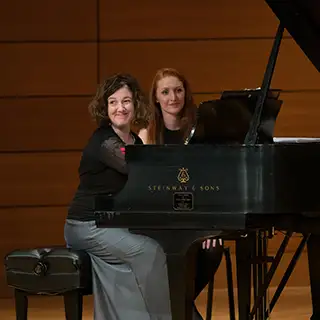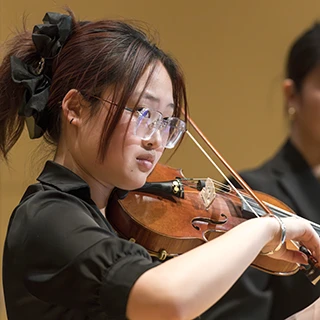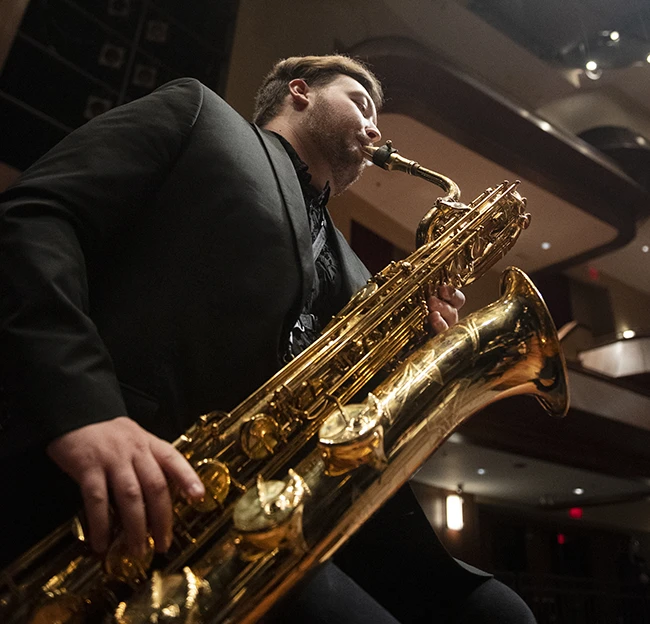Undergraduate Programs in Music
Pursue your passion for music with our Bachelor of Arts in Music or Bachelor of Music programs.
Studying Music at the University of Mississippi
Undergraduate students may choose to pursue either a Bachelor of Arts in Music or a Bachelor of Music in Music degree. Students choosing the Bachelor of Music degree may specialize in one of the areas of emphasis: Music Education or Music Performance. Students choosing the Bachelor of Arts in Music complement their major study of music with a minor in another field of study.
What Does it Mean to Major in Music?
The Bachelor of Arts in Music (B.A.) allows greater compatibility with other areas of study through a required minor field of study or double major. This well-rounded major is designed to provide the student with a broad liberal arts education as well as more specialized work in the applied area through a focus in either instrumental, keyboard, or voice.
The Bachelor of Music in Music (B.M.) prepares students to become professional musicians and educators. B.M. students must choose an emphasis in music performance or music education, each with a concentration in instrumental, keyboard, or voice.
Either way, it means working with your major professor one on one from the very start. Explore a universal language that knows no barriers while learning specific strategies for advancing your musical craft.
Degree Emphases


Music Education
Students prepare to teach at all levels of K-12 grade, with concentrations in keyboard, voice, or instrument. The program exceeds the minimum Mississippi Teacher Certification standards in vocal and instrumental music.


Music Performance
Students prepare to become professionals performing as woodwind, brass, string, or percussion instrumentalists, pianists, or vocalists and/or for graduate or professional school attendance.
Minor Information
A Minor in Music allows a student to include a study of music as a part of their liberal arts education, combined with other fields of study. The minor requires 20-21 hours which includes credit for performing in ensembles, attending music performances, studio lessons, and electives.
Continuing a study of music history and theory deepens understanding and enjoyment of music no matter what genre of music you like. If you plan to earn a degree in an other subject area but want to keep music in your life, a minor in music could be a good fit. Talk with your advisor about adding a minor in music to your degree program.
Like all other degrees from UM Music, a student must audition to demonstrate college preparedness on your instrument to minor in music.
Transfer Credits
The University of Mississippi accepts freshman music theory transfer credits from community colleges. Sophomore music theory credits, however, are not automatically transferred.
Undergraduate Diagnostic Exams
In order for students from community colleges to receive sophomore music theory credit at the University of Mississippi, two requirements must be met:
- Students must have received a grade of C or higher for sophomore theory at their community college.
- Students must pass a diagnostic exam for Music Theory III (Mus 205) and Music Theory IV (Mus 206) given by the theory area at the University of Mississippi.
Download Information about the Music Theory Diganostic Exam
Download the Undergraduate Music Theory Study Guide
Download an Undergraduate Practice Theory Exam (Written and Sight Singing)
Teacher Licensure Information
The Bachelor of Music in Music degree program offering an emphasis in music education meets the educational requirements for educator licensure in the state of Mississippi.
Music education teacher candidates wishing to teach in other states are encouraged to contact those state departments of education to determine licensure requirements.
All information on the UM School of Education’s Teacher Licensure page is specific to Mississippi licensure guidelines. Please note that we strongly encourage our teacher candidates to seek Mississippi licensure; our degree programs in education are nationally accredited.
Should a graduate decide to apply for licensure in another state and need an institutional recommendation form completed for that state application, you may email Dr. Whitney Webb at whitdt@olemiss.edu to assist you with this process.
Keyboard Musicianship
Policies & Procedures | Course Requirements | Diagnostic Exams
The following Keyboard Musicianship courses are available:
MUS 113: Fundamental Keyboard Musicianship I (2 credit hours)
MUS 114: Fundamental Keyboard Musicianship II (2 credit hours)
MUS 213: Intermediate Keyboard Musicianship I (2 credit hours)
MUS 214: Intermediate Keyboard Musicianship II (2 credit hours)
- Instrumental Music Education students are required to take (or exam out of, via the Keyboard Musicianship Diagnostic Exam) MUS 113 and MUS 114.
- Instrumental Performance, Vocal Performance, and Vocal Music Education students are required to take (or exam out of, via the Keyboard Musicianship Diagnostic Exam) MUS 113, MUS 114, MUS 213 and MUS 214.
The purpose of the diagnostic exams is to evaluate the keyboard proficiency of incoming music majors:
- Incoming first-year students with advanced keyboard ability can opt to take a keyboard diagnostic exam in order to establish keyboard proficiency, allowing for possible exemption from some or all of the required Keyboard Musicianship classes.
- Transfer students can find the Department of Music policy regarding the transferring of keyboard musicianship credits on page 10 of the 2019-2020 Student Handbook.
There are four levels of diagnostic exams that a student can choose to take: First Year MUS 113 and MUS 114 and Second Year MUS 213 and MUS 214. To pass a diagnostic exam, a student must demonstrate fluency in all aspects of the exam. If a student passes, he or she would establish keyboard proficiency for the level of exam taken. A written statement with exam results, certifying exemption from the applicable Keyboard Musicianship courses, would then be placed in the student’s file in the departmental office. The examiner will also send an email with the exam results to the student and the Chair of the Department of Music.
Otherwise, students must take their required Keyboard Musicianship courses in sequential order. To advance to the next course level, students must not only pass each course with a minimum C (2.0) final letter grade, they must also pass the cumulative final exam at the end of each semester, demonstrating keyboard proficiency for that course level.
We recommend that music majors fulfill the Keyboard Musicianship course requirements at the beginning of their degree. To permit implementation of this process, all incoming freshman music majors should enroll in MUS 113 during their initial semester on campus.
The diagnostic keyboard exams will be given at the beginning of the Fall and Spring semesters and must be completed by 12:00 noon on Friday of the first week of classes. Students are advised to take the exam when they enter the degree. Doing so will allow timely enrollment in the appropriate section of the course sequence.
To schedule an exam, students must contact Dr. Debra Atkinson (dsatkins@olemiss.edu). Exam materials will be drawn from Keyboard Musicianship, Book One (10th and 11th edition) or Keyboard Musicianship, Book Two (10th edition) by Lyke, Caramia, Alexander, Haydon and Chioldi, as well as additional supplementary materials.
Solo, vocal and instrumental repertoire must be approved by Dr. Atkinson in advance of the exams. Representative musical examples for each level of the diagnostic exams can be obtained by contacting Dr. Atkinson.
First Year Diagnostic Exam – MUS 113
Technique: Demonstrate correct fingering with steady rhythm. No more than 2 attempts per example.
1. White-key (starting note) Major and Minor five-finger pentascales, hands together, up and down.
2. Major scales: C, G, D, A, E, hands together, up & down, one octave, each ending with a cadential chord progression: I – V6 or V6/5 – I.
3. Minor scales: All 3 forms (natural, harmonic, melodic): a, c, d, e, f, g, hands together, up & down, one octave, each ending with a cadential chord progression: i – V6 or V6/5 – i.
Repertoire: One prepared solo piece (one page or more in length), appropriate for first year level.
Transposition: One simple, short piece in a Major key, transposed up to a second above or below the original key.
Harmonization: One folk song or simple melody in a Major key with blocked chord accompaniment, using I and V chord symbols. Closest position chords (using inversions) must be used.
Sight Reading: Two contrasting solo pieces appropriate for first-year level.
First Year Diagnostic Exam – MUS 114
Technique: Demonstrate correct fingering with a steady rhythm. No more than 2 attempts per example.
1. Black-key (starting note) Major and Minor five-finger pentascales, hands together, up and down.
2. Major scales: C, G, D, A, E, B, F, hands together, up & down, two octaves, each ending with a cadential chord progression: I – IV6/4 – I – V6 or V6/5 – I.
3. Major scales: F#, C#, hands together, up & down, two octaves.
4. Minor scales: All 3 forms (natural, harmonic, melodic): a, b, c, d, e, f, g, hands together, up & down, one octave, each ending with a cadential chord progression: i – IV6/4 – i – V6 or V6/5 – i.
5. Major and Minor arpeggios: C, D, E, F, G, A, B, hands together, up & down, two octaves.
Repertoire: One prepared solo piece (one page or more in length), appropriate for first-year level.
Transposition: One simple piece in a Major key, transposed up to a second above or below the original key.
Harmonization: Two folk songs or simple melodies in a Major and a Minor key with blocked chord accompaniment, using I and V chord symbols. Closest position chords (using inversions) must be used.
Sight Reading: Two contrasting solo pieces appropriate for first-year level.
Second Year Diagnostic Exam – Mus 213
Technique: Demonstrate correct fingering with a steady rhythm. No more than 2 attempts per example.
1. All Major and Minor five-finger pentascales, up and down.
2. All Major scales (white and black-key scales): hands together, up and down, two octaves, each ending with a cadential chord progression: I – IV6/4 – I – V6 or V6/5 – I.
3. Minor scales: All 3 forms (natural, harmonic, melodic): a, b, c, d, e, f, g, hands together, up & down, two octaves, each ending with a cadential chord progression: i – IV6/4 – i – V6 or V6/5 – i.
4. All Black-key (starting note) Minor scales: All 3 forms (natural, harmonic, melodic), hands together, up & down, one octave.
5. All Major & Minor arpeggios, two octaves, hands together.
Repertoire: Two prepared solo pieces (one page or more in length), appropriate for second year level.
Transposition: One piece, transposed up to second above or below the original key.
Harmonization: Two melodies with left-hand blocked chord accompaniment using chord symbols. Closest position chords (using inversions) must be used.
Score Reading: One three-part vocal score. Play any TWO voices in paired combinations ie. Soprano-Alto, Alto-Tenor, Soprano-Bass etc. as well as all three parts together simultaneously.
Sight Reading: Two contrasting solo pieces appropriate for second year level.
Second Year Diagnostic Exam – Mus 214
Technique: Demonstrate correct fingering with steady rhythm. No more than 2 attempts per example.
1.All Major and Minor five-finger pentascales, up and down.
2.All Major scales (white and black-key scales), hands together, up and down, two octaves, each ending with a cadential chord progression: I – IV6/4 – I – V6 or V6/5 – I.
3.All Minor scales, 3 forms (natural, harmonic, melodic), hands together, up and down, two octaves, each ending with a cadential chord progression: i – iv6/4 – i – V6 or V6/5–i.
4.All Major & Minor arpeggios two octaves, hands together.
Repertoire:
1.One prepared solo piece (one page or more in length), appropriate for second year level.
2.One simple vocal accompaniment.
3.One simple instrumental accompaniment.
Transposition: One piece, transposed up or down a major step from the original key.
Harmonization:
1.One melody with left-hand blocked chord accompaniment using chord symbols.Closest position chords (using inversions) must be used.
2.One melody with left-hand patterned accompaniment ie. Waltz, March, or Alberti Bass. Closest position chords (using inversions) must be used.
Score Reading:
1.One three-part vocal score. Play any TWO voices in paired combinations ie. Soprano-Alto, Alto-Tenor, Soprano-Bass etc. as well as all three parts together simultaneously.
2.One four-part vocal score. Play any TWO voices in paired combinations ie.Soprano-Alto, Alto-Tenor, Soprano-Bass etc. as well as all four parts together simultaneously.
Sight Reading: Two contrasting solo pieces appropriate for second year level.
